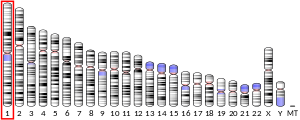
Methylenetetrahydrofolate reductase

452417769ENSG00000177000ENSMUSG00000029009P42898Q9WU20NM_005957NM_001330358NM_001161798NM_010840NP_001317287NP_005948NP_001155270NP_034970Methylene tetrahydrofolate reductase (MTHFR) is the rate-limiting enzyme in the methyl cycle, and it is encoded by the MTHFR gene. Methylenetetrahydrofolate reductase catalyzes the conversion of 5,10-methylenetetrahydrofolate to 5-methyltetrahydrofolate, a cosubstrate for homocysteine remethylation to methionine. Natural variation in this gene is common in otherwise healthy people. Although some variants have been reported to influence susceptibility to occlusive vascular disease, neural tube defects, Alzheimer's disease and other forms of dementia, colon cancer, and acute leukemia, findings from small early studies have not been reproduced. Some mutations in this gene are associated with methylenetetrahydrofolate reductase deficiency. Complex I deficiency with recessive spastic paraparesis has also been linked to MTHFR variants. In addition, the aberrant promoter hypermethylation of this gene is associated with male infertility and recurrent spontaneous abortion. Methylene tetrahydrofolate reductase (MTHFR) is the rate-limiting enzyme in the methyl cycle, and it is encoded by the MTHFR gene. Methylenetetrahydrofolate reductase catalyzes the conversion of 5,10-methylenetetrahydrofolate to 5-methyltetrahydrofolate, a cosubstrate for homocysteine remethylation to methionine. Natural variation in this gene is common in otherwise healthy people. Although some variants have been reported to influence susceptibility to occlusive vascular disease, neural tube defects, Alzheimer's disease and other forms of dementia, colon cancer, and acute leukemia, findings from small early studies have not been reproduced. Some mutations in this gene are associated with methylenetetrahydrofolate reductase deficiency. Complex I deficiency with recessive spastic paraparesis has also been linked to MTHFR variants. In addition, the aberrant promoter hypermethylation of this gene is associated with male infertility and recurrent spontaneous abortion. In the rate-limiting step of the methyl cycle, MTHFR irreversibly reduces 5,10-methylenetetrahydrofolate (substrate) to 5-methyltetrahydrofolate (product). MTHFR contains a bound flavin cofactor and uses NAD(P)H as the reducing agent. Mammalian MTHFR is composed of an N-terminal catalytic domain and a C-terminal regulatory domain. MTHFR has at least two promoters and two isoforms (70 kDa and 77 kDa). MTHFR activity may be inhibited by binding of dihydrofolate (DHF) and S-adenosylmethionine (SAM, or AdoMet). MTHFR can also be phosphorylated – this decreases its activity by ~20% and allows it to be more easily inhibited by SAM. The enzyme is coded by the gene with the symbol MTHFR on chromosome 1 location p36.3 in humans.There are DNA sequence variants (genetic polymorphisms) associated with this gene.In 2000 a report brought the number of polymorphisms up to 24.Two of the most investigated are C677T (rs1801133) and A1298C (rs1801131) single nucleotide polymorphisms (SNPs). The MTHFR nucleotide at position 677 in the gene has two possibilities: C (cytosine) or T (thymine). C at position 677 (leading to an alanine at amino acid 222) is the normal allele. The 677T allele (leading to a valine substitution at amino acid 222) encodes a thermolabile enzyme with reduced activity. Individuals with two copies of 677C (677CC) have the most common genotype. 677TT individuals (homozygous) have lower MTHFR activity than CC or CT (heterozygous) individuals. About ten percent of the North American population are T-homozygous for this polymorphism. There is ethnic variability in the frequency of the T allele – frequency in Mediterranean/Hispanics is greater than the frequency in Caucasians which, in turn, is greater than in Africans/African-Americans. The degree of enzyme thermolability (assessed as residual activity after heat inactivation) is much greater in 677TT individuals (18–22%) compared with 677CT (56%) and 677CC (66–67%). Individuals of 677TT are predisposed to mild hyperhomocysteinemia (high blood homocysteine levels), because they have less active MTHFR available to produce 5-methyltetrahydrofolate (which is used to decrease homocysteine). Low dietary intake of the vitamin folic acid can also cause mild hyperhomocysteinemia.
